Thomas Latimer
IN his preface to this lively and excellent biography Mr. Lambert makes a point so obvious that most of us have forgotten it. We tend to suppose that all the important people, who have shaped social conditions or influenced policy, have lived in London. The role of the provinces in history, as far as we are concerned, has been to breed men who become important only so soon as they step into the metro- politan limelight. The idea that the provinces themselves should have a share or an initiative in shaping history has not entered our thoughts.
Such unconscious complacence gets a jolt from the history of Thomas Latimer, a West Country journalist who flourished at Exeter for some 5o years in the last century. Latimer, who came to the city as a young man in 1827, made such headway that in a few years he was appointed editor of the Western Times. In his hands this rather weakly and uninfluential journal rose to real power. He improved its appearance, he lengthened and invigorated its leaders, he used it as a weapon in his battle against indifference and corruption. Outspoken attacks upon various abuses quickly brought him into con- flict with the Bishop of Exeter, a conflict which lasted without break till 1848, when Latimer, arraigned for libel, gained a victory that far outshone in importance the blaze of joy it kindled in the West. Hard hitter though Latimer was, the Bishop, Henry Phillpotts, was a strong antagonist. Self-willed, arrogant, cunning, and wholly unscrupulous, he pursued his course with an energy that almost compels one to admire him. Nothing to do with securing appointments, browbeating curates, harrying Nonconformists, and aggrandising his own position came amiss to the Bishop. When at last Latimer charged him with open perjury, Phillpotts, who had been waiting for just such a chance, brought an action for libel. The case attracted wide attention, since it was the first for which the new plea of justification was entered : and, despite all prejudice, and dead against the summing up of the judge, the jury found Latimer's charges proven and gave him the verdict.
For fifty years this robust, vigorous man, who thought nothing of walking from Exeter to London and back, cham- pioned every deserving cause and every underdog that came his way. From the unhappy Edmund Galley to the shame- fully maltreated Gunner Charlton, even to the case of Petherick, Sloggett, and Sanders, Latimer rolled up his sleeves to help them all. The case of Galley, sentenced against weight of evidence to transportation for a crime he never committed, and of the pardon and compensation wrung from an unwilling Administration after more than forty years, makes enthralling if salutary reading. Mr. Lambert has handled it brilliantly. His picture of the man and of his background could hardly be bettered. This book must be a standard work for all who are interested in journalistic history and in life in




































 Previous page
Previous page